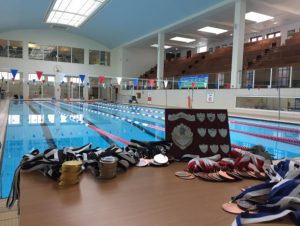- You have one and a half hour to complete this training course
- It is compulsary that at least one parent MUST be registered and Trained as an Official
The systems used to measure the time swimmers take to cover the distance of an event vary from manually operated digital stop watches to the more modern electronically operated automatic timing devices and video cameras. Timekeepers perform a very important function at any swimming gala. The timing of a swimmer is the one aspect of the proceedings that is kept on record. No one remembers what the referee or the judges did, but the timekeepers’ work is kept. Reputations stand or fall by the times recorded and they form the basis for a swimmer’s future tactics and goals. The same responsibilities and duties apply to timekeepers at national, inter-provincial, league, age group, school trials, club championships and even club nights. The accuracy of the times recorded is as important to the swimmers finishing at the back of the field as it is to the winners and record breakers.  These swimmers accept that they cannot all be winners but they set their own goals in possibly obtaining a certain position, or achieving their personal best times. In short, timekeepers perform an important role and have a very responsible part to play at all competitions. Timekeepers can add greatly to the smooth running of a gala if they know what is expected of them and also have a good idea of what the other officials at a gala are doing so that their respective duties can be coordinated. Knowing how you fit into the whole gala organization can make timekeeping interesting and can contribute to your enjoyment of a gala. Swimmers make many sacrifices and work hard for their results; we therefore owe it to them to ensure that accurate times are achieved to cover their performances.
These swimmers accept that they cannot all be winners but they set their own goals in possibly obtaining a certain position, or achieving their personal best times. In short, timekeepers perform an important role and have a very responsible part to play at all competitions. Timekeepers can add greatly to the smooth running of a gala if they know what is expected of them and also have a good idea of what the other officials at a gala are doing so that their respective duties can be coordinated. Knowing how you fit into the whole gala organization can make timekeeping interesting and can contribute to your enjoyment of a gala. Swimmers make many sacrifices and work hard for their results; we therefore owe it to them to ensure that accurate times are achieved to cover their performances.
